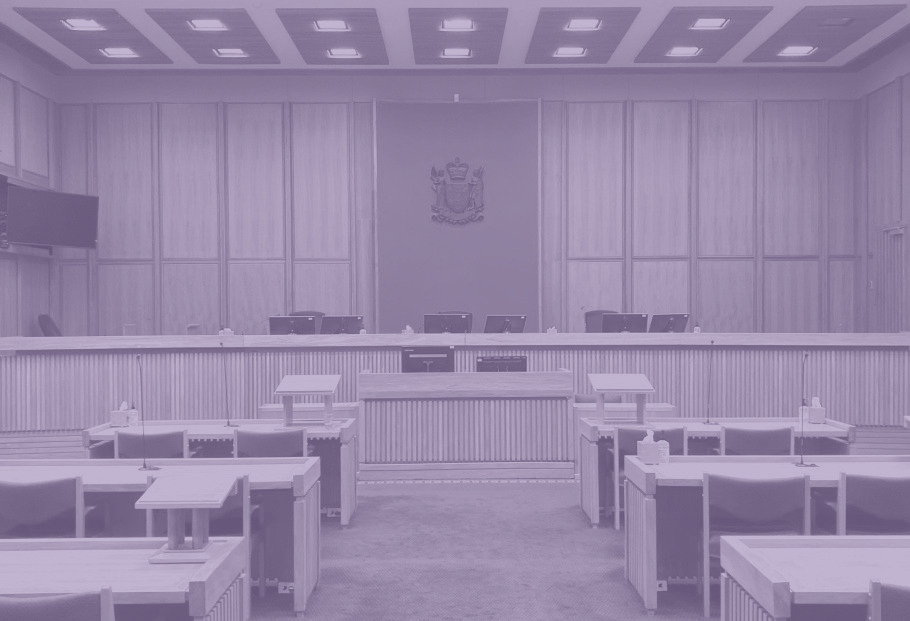By Laura Oh
In a move that has generated widespread concern, the Government’s decision to remove funding for section 27 cultural reports has the potential to unravel the progress made in ensuring fair and equitable access to justice for all. This action, part of National’s 100-day plan [1], is posited as a crucial step towards effective spending of taxpayer funds [2] and restoring law and order to Aotearoa New Zealand [3].
But who will be impacted most by this decision? And is this act of urgency an effective way to achieve these objectives?
What are “Cultural Reports”?
Cultural reports, ordered under section 27 of the Sentencing Act 2002, allow an offender to provide background information relevant to their offending for consideration during sentencing [4]. The reports are about finding “equitable, effective and tailored” outcomes in sentencing [5] and can lead to between a 7% to 45% reduction in an offender’s sentence [6]. National’s Legal Services Amendment Bill, which removes legal aid funding for these reports, passed in Parliament on March 6th as a matter of urgency [7].
A Public Misconception – “Cultural Reports are Only for Specific Groups”
A common misconception is that Section 27 reports can only be requested by offenders from specific cultural backgrounds [8]. This is incorrect. Under the Sentencing Act 2002, any offender can request a cultural report [9]. While Māori have factors that are unique to them, such as the impact of colonisation, other cultural backgrounds also have specific factors that help a court better understand an offender’s background [10].
Why the Removal?
Whilst cultural reports have been around since 2002 [11], they only recently came under fire with their surge in use from 2019 [12]. In 2022, 2,429 reports were funded through legal aid and the Public Defence Service at a cost of $6.45 million. By comparison, just nine reports were funded in 2017, at a cost of $17,164. [13]. ACT Party Leader David Seymour states cultural reports have allowed for a “cottage industry” of “getting criminals softer sentences” [14]. Furthermore, some judges are concerned about the content of the reports being based on the self-reporting of an offender [15].
But is removing legal aid funding the solution?
Who Will Be Impacted the Most?
Excluding Section 27 reports from legal aid funding has significant implications, particularly for individuals of low socioeconomic status and Māori.
Prime Minister Christopher Luxon points out that the legislation only removes funding and does not ban the use of the reports in sentencing [16]. Whilst technically true, the lack of legal aid funding will likely mean those from low socioeconomic backgrounds will no longer have this option [17]. The Labour Party’s Justice spokesperson, Duncan Webb, has criticised National and its coalition partners’ approach as “one dimensional”, arguing that it disregards the diverse circumstances and financial abilities of those navigating the justice system [18].
It is well known that Māori are overrepresented in the justice system [19]. Removing funding could worsen this disparity, as current Minister of Justice Paul Goldsmith identified [20]. The Cabinet document Goldsmith prepared identified that Māori and Pacific individuals make up a higher proportion of offenders requesting the legally funded report (14% and 11%) compared to individuals of Pākehā and other descent (7%) [21]. However, the full implications of the legislation for Māori are unknown. Goldsmith stated that there was no consultation with Māori due to time constraints, despite a “strong Te Tiriti o Waitangi/ Treaty of Waitangi-based argument” to do so [22].
Removing legal aid funding for Section 27 reports also undermines the right to a fair trial [23]. Being able to use the reports in sentencing ensures a judge has all the relevant information to impose the most appropriate sentence [24]. The legislation change disadvantages offenders who require financial support to present their circumstances fully. [25]. The option of a cultural report for all offenders is essential, as according to Judge Timothy Brewer, the reports “help me to understand the journey that brought [offenders] to the courtroom today” [26].
Will the Legislation Achieve its Initial Objectives?
While legal aid funding has been removed partly to reduce taxpayer costs, experts argue it will do the opposite. Criminal barrister Emma Priest believes the legislation will increase taxpayer costs and make it harder for judges and lawyers to obtain crucial information, which they have an obligation to do [27]. Others have weighed the cost to taxpayers from funding cultural reports against the cost of putting more people in prison and argue the latter will cost significantly more. As experienced lawyer Kingi Sneglar phrased the issue, “We spend a billion dollars a year building prisons and incarcerating Māori . . . and a few million to look at why people offend. There’s no comparison in terms of the amount that we are investing” [28].
Furthermore, legal experts have suggested that better solutions may be available. Law Society President Frazer Barton stated that concerns surrounding the cultural report “appear to be largely financial concerns and concerns relating to the perceived impact of these reports on sentencing outcomes” [29]. Khylee Quince, Dean of the AUT School of Law, felt that “parameters” could be put into place to reduce the variation across reports without “throwing the baby out with the bathwater” [30]. Furthermore, the Second Reading of the Bill in Parliament highlighted that the Cabinet document provided alternatives to defunding, such as imposing a cap on report writer’s fees and introducing an accreditation scheme for Section 27 report writers [31].
Concluding Thoughts
The decision to defund section 27 cultural reports may cut taxpayer costs in the short term but risks potentially high costs to the justice system’s fairness and inclusivity. The Government’s move could disproportionately impact Māori and those of low-income backgrounds, exacerbating existing inequities through the absence of crucial information in sentencing. Whilst intended to save taxpayer funds, experts caution it may ultimately increase long-term expenses where more effective alternatives could be used.
Footnotes:
[1] https://www.national.org.nz/100dayplan
[2] https://www.national.org.nz/dealing_with_the_cost_of_living_crisis
[3] https://www.national.org.nz/restoringlawandorder
[4] https://www.aut.ac.nz/news/stories/courts-change-without-cultural-reports
[5]https://www.lawsociety.org.nz/news/newsroom/advocacy-in-action/access-to-justice-impacted-by-proposed-repeal-of-sentencing-report-funding/
[6]https://www.waikatotimes.co.nz/nz-news/350083336/cultural-reports-based-criminals-word
[7]https://www.1news.co.nz/2024/03/06/bill-passes-to-remove-taxpayer-funding-for-cultural-reports/
[8]https://thespinoff.co.nz/politics/13-11-2023/what-are-cultural-sentencing-reports-and-why-does-the-national-want-to-scrap-them
[9]https://thespinoff.co.nz/politics/13-11-2023/what-are-cultural-sentencing-reports-and-why-does-the-national-want-to-scrap-them
[10] https://www.whakakupu.nz/for-defendants
[11]https://www.nzherald.co.nz/nz/ending-legal-aid-for-cultural-reports-at-sentencing-could-make-court-hearings-longer-costlier/6TOT4UDI5RAXBIS7MTPHRKOENQ/
[12]https://www.stuff.co.nz/national/124423171/large-increase-in-number-and-cost-of-cultural-reports-for-offenders
[13]https://legislation.govt.nz/bill/government/2024/0012/latest/d5833260e2.html#:~:text=General%20policy%20statement,(a%20section%2027%20report%20).
[14]]https://www.act.org.nz/_cost_of_cultural_reports_skyrockets_under_labour_but_lawlessness_continues
[15]https://www.waikatotimes.co.nz/nz-news/350083336/cultural-reports-based-criminals-word
[16]https://www.rnz.co.nz/news/national/508705/axeing-of-cultural-reports-funding-will-hurt-poorer-sections-of-society-experts-say
[17]https://www.rnz.co.nz/news/political/510971/legislation-scrapping-funding-for-section-27-cultural-sentencing-reports-passes-under-urgency
[18]https://www.rnz.co.nz/news/political/510971/legislation-scrapping-funding-for-section-27-cultural-sentencing-reports-passes-under-urgency
[19]https://www.justice.govt.nz/justice-sector-policy/key-initiatives/key-initiatives-archive/hapaitia-te-oranga-tangata/#:~:text=M%C4%81ori%20are%20overrepresented%20at%20every,of%20the%20New%20Zealand%20population.
[20]https://newsroom.co.nz/2024/02/28/goldsmith-says-nixing-cultural-reports-likely-to-put-more-maori-in-prison/
[21]https://www.justice.govt.nz/assets/Documents/Publications/Proactive-release-Legal-Services-Amendment-Bill_FINAL.pdf
[22]https://www.justice.govt.nz/assets/Documents/Publications/Proactive-release-Legal-Services-Amendment-Bill_FINAL.pdf
[23]https://www.nzherald.co.nz/nz/ending-legal-aid-for-cultural-reports-at-sentencing-could-make-court-hearings-longer-costlier/6TOT4UDI5RAXBIS7MTPHRKOENQ/
[24]https://www.nzherald.co.nz/nz/ending-legal-aid-for-cultural-reports-at-sentencing-could-make-court-hearings-longer-costlier/6TOT4UDI5RAXBIS7MTPHRKOENQ/
[25]https://newsroom.co.nz/2024/02/28/goldsmith-says-nixing-cultural-reports-likely-to-put-more-maori-in-prison/
[26]https://www.waikatotimes.co.nz/nz-news/350083336/cultural-reports-based-criminals-word
[27]https://newsroom.co.nz/2024/02/23/scrapped-cultural-reports-wont-save-taxpayer-dollars/
[28]https://www.auckland.ac.nz/en/news/2023/08/22/cultural-reports-university-auckland-law.html
[29]https://www.lawsociety.org.nz/news/newsroom/advocacy-in-action/access-to-justice-impacted-by-proposed-repeal-of-sentencing-report-funding/
[30]https://newsroom.co.nz/2023/06/26/maori-justice-experts-warn-against-scrapping-cultural-report-funding/
[31]https://www.parliament.nz/mi/pb/hansard-debates/rhr/combined/HansDeb_20240220_20240220_64




